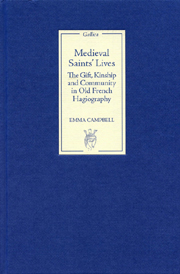Conclusion
Published online by Cambridge University Press: 05 February 2013
Summary
The outside is not another space that resides beyond a determinate space, but rather, it is the passage, the exteriority that gives it access – in a word, it is its face, its eidos. The threshold is not, in this sense, another thing with respect to the limit; it is, so to speak, the experience of the limit itself, the experience of being-within an outside.
(Agamben, The Coming Community, p. 68)The relationships that saints' lives mediated and constituted – and might still mediate and constitute – feature only indirectly in this examination of old french hagiography; my readings of french vernacular saints' lives have been, first and foremost, explorations of the economies that underwrite such relationships. In investigating social and sexual economy in vernacular saints' lives I have focused on the structures that allow relationships to emerge and the ways in which these structures are given narrative articulation. This has been an examination of the narrative conditions that make relationships possible, and the possible relationships that such conditions might engender. The absence of relationships from this book is therefore explained by the fact that relationships are inevitably absent from saints' lives themselves: the forms of kinship and community that vernacular hagiography projects onto its audiences are never fully realized within the textual confines of this literature but are instead the potential outcome of the readings that these texts encourage.
- Type
- Chapter
- Information
- Medieval Saints' LivesThe Gift, Kinship and Community in Old French Hagiography, pp. 223 - 230Publisher: Boydell & BrewerPrint publication year: 2008



